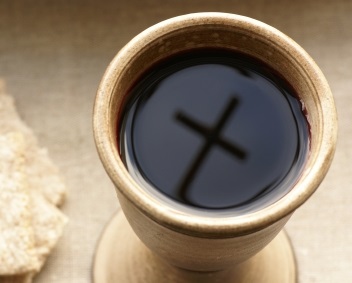Jesus & the Prophets – the Cup of Christ … (10/29/18)
Throughout the texts of the Hebrew Bible the “cup” functioned as a powerful metaphor for every individual’s chosen fate (“The LORD is my chosen portion and the cup of my inheritance” ~ Psalm 16:5) – either the “cup of wrath” for those who are disobedient towards the Law by being selfish towards others1 or the “cup of salvation” for those who abide in the will of that heavenly Father.2 The writings of “the prophets” make specific mention of this “cup” as well, with Jeremiah making direct & threatening mention of “the cup of wrath” (see Jeremiah 25:15-29 & Jeremiah 49:12 – also Habakkuk 2:15-16) and Isaiah mentioning a merciful offer of reprieve from the same (see Isaiah 51:17-22‘s “See how I have taken from your hand the cup of staggering. You shall drink no more from the bowl of my wrath”) … And yet in direct allusion thereto, Jesus offers a very different “cup” to his followers; not a cup of leniency or comfort to those merely obedient to the edicts of the Law, but rather a cup of willingly joyful self-sacrifice for one’s fellows – a cup of unconditional kindness for all strangers, a cup of forgiving mercy for all enemies, a cup of selfless service for all those abused &/or downtrodden. For this is the “Cup of Grace” from which Jesus asks us to drink – a cup filled with the selfless Love of his newer & far better covenant (see Hebrews 8:8-13), a cup we each must “pour out for the many for the forgiveness of their transgressions” (see Matthew 26:27-28), a cup of courageous self-sacrifice that is often terrifying to imbibe (via Matthew 26:39‘s “Father, let this cup pass from me, and yet let not my will but rather thine be done” – also Mark 14:36, Luke 22:42, & John 18:11) and yet a cup that must be imbibed nonetheless (see Matthew 18:3-4, Matthew 24:12-14, Matthew 26:53-54, Luke 9:23, John 13:15-17, & John 18:11 et al).3 And indeed, this is the very same cup Jesus references when answering the query of “the sons of Zebedee” in Mark 10:35-40, telling them in no uncertain terms that asking for personal glory &/or seeking individual reward have no place in the lives of his Way’s true followers (“You do not understand what you are asking. Are you able to drink the cup that I am drinking?” ~ Mark 10:38) – that selfless service & humble kindness form the only path to the salvation provided by his Kingdom4, and that any other heavenly rewards that might come therefrom are not his to give, but rather will come automatically to all those who enliven his teachings – to all “those for whom it has been prepared [by the Father]” (Mark 10:40).5

…………………………………………………………………..
1 Psalm 11:5-6 exclaims that “The LORD tests both the righteous and the wicked, and His soul despises the lovers of violence. On the wicked will rain coals of fire & sulfur; a scorching wind shall be the portion of their cup” and Psalm 75:8 similarly states that “In the land of the LORD there is a cup of foaming wine. He will pour a draught from it, and the wicked of the earth shall drain it to the dregs.”
2 NOTE the positive contrast provided by both Psalm 23:5-6 (where David writes “You anoint my head with oil and my cup overflows”, and this while metaphorically sitting at a table prepared “in the presence of my enemies”; readily explaining why the psalmist concludes the same passage by proclaiming “Goodness and mercy will quite assuredly follow me all the days of my life”) and Psalm 116:13-14 (where this same, mercy-full “cup of salvation” is referenced).
3 Even Paul, the self-anointed faux apostle, recognized this Truth (though he clearly failed to practice the same) when he plainly & quite correctly wrote that, “We cannot [simultaneously] drink from the cup of the Lord and the cup of demons.” (see 1 Corinthians 10:21).
4 This is why Jesus repeatedly calls upon his listeners to follow him like very young children – toddlers who have yet to forget that life is not about what one can attain or accumulate, but rather is a blessed opportunity to enhance the joy of others &/or relieve their burdens (see Matthew 18:3-10, Mark 9:33-37, Mark 10:13-15, & Luke 6:35 – also John 12:36).
5 This encounter is also shared in Matthew 20:20-23, though in Matthew‘s account it is the mother of James & John who asks for the mentioned blessing, not the men themselves. It is unclear why the author of this Gospel added the mother’s role to the tale, and yet most scholars are in agreement that Mark is the first thereof, and that the two accounts relay the same encounter. Either way, it is important to NOTE that Jesus’ question in the ancient Greek manuscripts of both Gospels is posed in such a way that a negative response from James & John is correctly expected – that it was impossible for anyone seeking selfishly to find the salvation that comes from his Way’s humble selflessness.




 ;
;